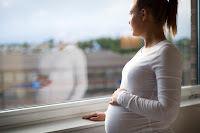
Exposure to most antipsychotics in the womb does not appear to increase the risk of neurodevelopmental disorders in children after controlling for other factors, such as the mother’s illness and lifestyle behaviors, according to a report published today in JAMA Internal Medicine.
“These findings provide much needed clarity regarding NDD [neurodevelopmental disorders] risk and may help to inform treatment decision-making in pregnancy, which is a sophisticated trade-off between benefits and risks,” wrote Loreen Straub, M.D., M.S., of Harvard Medical School and colleagues. “Although the observed 2-fold increase in risk of [neurodevelopmental disorders] is not causally related with in utero exposure to antipsychotic drugs, it does highlight the importance of closely monitoring the neurodevelopment of the offspring of women with mental illness to ensure that early intervention and support can be instituted when needed.”
Straub and colleagues made use of national health insurance databases, both public and private, to compile information on mothers who filled a prescription for any antipsychotic medication during the second half of pregnancy and their children. (The researchers focused on antipsychotic use in the second half of pregnancy because it marks a period of significant brain development for a fetus.) They compared the rates of the following neurodevelopmental disorders in the children exposed to antipsychotics in the womb with those who were not exposed: autism spectrum disorder, attention-deficit/hyperactivity disorder, learning disability, speech or language disorder, developmental coordination disorder, intellectual disability, and behavioral disorder.
By age 8, 37.3% of publicly insured children and 24.5% of privately insured children whose mothers took antipsychotics during the second half of pregnancy had been diagnosed with at least one neurodevelopmental disorder; in comparison, 23.7% of publicly insured children and 11.0% of privately insured children with no antipsychotic exposure were diagnosed with a neurodevelopmental disorder.
The researchers calculated that antipsychotic exposure during pregnancy was associated with a 1.9-fold increased risk of any neurodevelopmental disorders, with similar risks seen for first-generation antipsychotics, such as haloperidol, or second-generation antipsychotics, such as olanzapine. After adjusting for such variables as the mother’s underlying illness and comorbidities, sociodemographic factors, and lifestyle behaviors (such as smoking or drinking), most antipsychotics were no longer associated with any increased risk of neurodevelopmental disorders. The one exception was in children whose mothers who took aripiprazole in the second half of pregnancy; this population had a 1.36-fold increased risk of neurodevelopmental disorders.
Straub and colleagues noted that aripiprazole is a newer antipsychotic that exerts slightly different effects on dopamine receptors. “This action can result in lactation problems owing to prolactin reduction. Therefore, a potential hypothesis is that aripiprazole’s association with [neurodevelopmental disorders] may be mediated through a reduction in breastfeeding. Our data did not include information on breastfeeding, which may be an important avenue to explore in future studies,” they wrote.
Straub and colleagues also noted that the potential risks identified for aripiprazole require replication in other data sources before causality can be assumed.
To read more on this topic, see the Psychiatric News article “Taking Some Antipsychotics During Pregnancy May Raise Risk of Gestational Diabetes.”
(Image: iStock/kjekol)
Don't miss out! To learn about newly posted articles in Psychiatric News, please sign up here.

